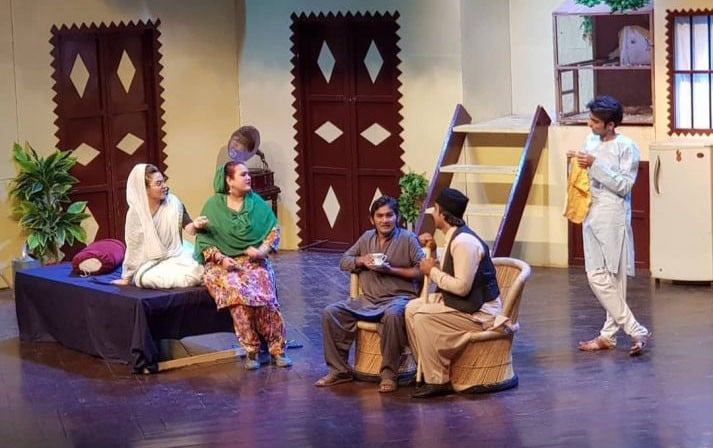
Anwar Maqsood’s play, Naach Na Jaanay, highlights the tragic condition of performing artistes but not without his characteristic one-liners

Anwar Maqsood is a man of many parts. He started his career as a journalist and then moved on to write for television. Initially, he just wrote skits that became popular and made him one of the most sought after teleplay writers. It was good that he did not rest on his laurels. He wrote more plays for television that dealt with the human dilemma in a more rounded manner. He has also written quite extensively on the condition of artistes in our society and has been able to cast their plight in a sympathetic light.
His play, Naach Na Jaanay, staged last week at Lahore’s Alhamra, was a reminder yet again that he is a writer of significance. Under the direction of Dawar Mehmood for Kopykats Production, the play was successful in conveying to the audiences the tragic aspects of the condition of performing artistes in our society -- the laughter and the one-liners notwithstanding.
Anwar Maqsood tends to receive more plaudits when he writes about topical issues. The viewers are always on the edge, calling for blood. Seeing famous figures caricatured and made fun of, endears the makers of the play to the audiences. It probably provides relief for the pent up emotions and frustrations. Maybe it releases the feeling of envy or jealousy about those who have been successful or have a public role to play, while the ordinary people -- couch potatoes -- sit on the sidelines whining, grousing, complaining and snapping.
The problem with plays that have a topical theme is that they tend to exhaust themselves with the passage of time, since the issues that the plays have been written about fizzle out and are no longer topical enough. In Pakistan, many of the issues that have been written about with the view that the topicalness will find a ready audience, have proved quite lasting, because the issues, although they had appeared topical, do not get resolved or go away.
The great pull to write about the current issues is about the draw because the issue is live and the audiences connect to it and find instant identification. This, of course, is one major cause for the play or the film to be a ready success because it seems that the play itself is a part of the effort at seeking a resolution to the issue. The audiences, too, feel they are a part of the effort and so not viewing things from a distance.
Since activism became a buzzword, all else has fallen prey to it. It has found a ring of seduction to which many succumb and so appear to be part of the solution rather than the problem. Activism has thus substituted politics, displaced journalism and sidelined voluntary work. To jump into the fray seems to be the mantra for either solving a problem or being very sensitive to it and wanting to be seen trying rather than being a bystander, or worse still, a thinking type, standing aloof and not wanting to dirty one’s hands.
The latter is a negative character type these days. The one itching to go meets the approval of the majority - irrespective of whether anything gets done in the end. No one has the patience to wait for the end. Everybody desires to be part of the action all the time.
Too many people seem to believe today that theatre, too, should have an instigative power so that the moment the action is over on stage the audiences pour out into the street to put into action what was seen on stage. This is how some of the revolutionary stage plays and films were seen and assessed in parts of the twentieth century. The audiences, it was believed, should be sufficiently roused to take the battle to the enemy. Thankfully, those days are over. But in the era of activism, a little more deliberation is required all the time to put the issues in proper perspective. Not everything can be resolved through activism and it tends to exhaust itself out so that nothing remains for the necessary follow-up. Activism is for the activists and it is not a substitute for journalism and politics -- even social work.
Anwar Maqsood’s plays Paune Chauda August and Sawa Chauda August were meant to arouse surface reaction, if one may use this term. Those did not, and do not, strike a deeper chord. But when he writes about human condition his work is seen by people in power as lacking a cause. He moves to a deeper level and addresses the core of some of our cultural attitudes which are too deeply ingrained to be erased or assuaged by some laws or actions. What is beyond the topical is where the true calling of the writer lies.
Dawar Mehmood handled the cast well. Hassan Raza in the main role of Akber, and the characters of Mehboob Sahib played by Taha Humayun, Jahan Ara by Sara Bhatti, Chaudary Sahib, the zamindar, by Asad Gujjar and Sultana by Hina Rizvi were well conceived and executed.
Dawar Mehmood has been a very consistent fellow traveller. He has shown commitment to the cause of serious theatre. Without him, one wonders, whether Anwar Maqsood would have made the same impact on stage or not. Maqsood found a visual interpreter to his sensibility but Dawar Mehmood should be lauded for his directorial effort. One hopes that the two keep working in tandem for the good of theatre.